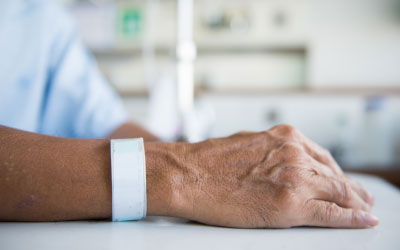Immunotherapy for Leukemia
Immunotherapy taps into the power of the immune system to help it find and destroy leukemia cells. Doctors may use immunotherapy drugs as a first treatment or in combination with other therapies. Some people get immunotherapy as a maintenance drug to lower the risk of cancer coming back.
How does immunotherapy treat leukemia?
The immune system is your body’s key defense against germs, infections, and illnesses. It includes the lymphatic system, which makes white blood cells called lymphocytes. B-lymphocytes (B-cells) make antibody proteins that fight foreign bacteria, toxins, and viruses. T-lymphocytes (T-cells) help the immune system attack diseased or cancerous cells.
Although the immune system does a good job identifying and getting rid of unwanted substances like germs, it has a harder time with leukemia cells. The immune system doesn’t always recognize these diseased cells as a threat because the cells started out healthy. Some leukemia cells may still appear normal, which helps them evade the immune system’s defenses. Even when the immune system recognizes a cancer threat, it may not generate a strong enough response to get rid of the diseased cells.
Immunotherapy treats leukemia in different ways depending on the specific drug. An immunotherapy drug may:
- Modify the body’s natural immune cells to help the immune system better identify and attack leukemia cells
- Restore immune system functions via lab-made substances similar to those naturally made by the immune system
Who needs immunotherapy for leukemia?
Immunotherapy can help if a cancer doesn’t respond to leukemia treatments like chemotherapy. This drug resistance, known as refractory cancer, may be present when treatments start or develop over time during treatments. Immunotherapy also helps if the cancer comes back (cancer recurrence or relapse). Some people get immunotherapy along with treatments like targeted therapy. Doctors sometimes use immunotherapy as a childhood leukemia treatment.
Immunotherapy drugs can treat certain types of leukemia and other blood cancers, such as:
What are the types of immunotherapies for leukemia?
Types of immunotherapies for leukemia include:
- Chimeric antigen receptor T-cell therapy (CAR T-cell therapy)
- Donor lymphocyte infusion
- Monoclonal antibodies
- Immune checkpoint inhibitors
Chimeric antigen receptor T-cell therapy (CAR T-cell therapy)
Car T-cell therapy modifies T-cells, improving their ability to recognize and destroy leukemia cells. The therapy involves removing T-cells from blood, adding chimeric antigen receptors (proteins) to the cells, and then returning the modified T-cells to the body. The receptors improve the CAR T-cells’ abilities to identify and attack leukemia cells.
Donor lymphocyte infusion
Donor lymphocyte infusion helps people with certain cancers like CML who have an unsuccessful stem cell transplant or a cancer relapse after a transplant. An IV infusion of T-cells from the original stem cell donor brings on an intense immune response to leukemia cells known as graft-versus-tumor (GVT) effect. The donor T-cells attack and stop the growth of lingering leukemia cells, putting the disease into remission (no evidence of disease).
Monoclonal antibodies
Monoclonal antibodies are lab-made proteins that mimic the body’s natural antibodies. They help the immune system get better at finding and targeting leukemia cells. The IV drug attaches to a specific substance on a cancer cell’s surface, where it interferes with the cell’s ability to multiply and function. Because monoclonal antibodies target cancer cells, they’re also a type of targeted therapy.
Immune checkpoint inhibitors
Immune checkpoint inhibitors are a type of monoclonal antibody. Checkpoint proteins on cells turn on (activate) to let the immune system know when there’s a problem. Leukemia cells sometimes turn off these checkpoints to avoid detection. Immune checkpoint inhibitors block the signals that allow cancer cells to turn off checkpoints. With the checkpoints activated, the immune system can find and destroy cancer cells.
What are the side effects of immunotherapy for leukemia?
Because immunotherapy utilizes your body’s natural defenses, the medicines tend to cause fewer immediate side effects than treatments like chemotherapy. Immunotherapy side effects vary from person to person. They may occur during treatment or after treatment ends. In rare instances, an immunotherapy drug causes the immune system to attack healthy cells. There are steps you can take to manage treatment side effects.
Side effects of immunotherapy include:
- Blood pressure changes
- Breathing problems
- Extreme fatigue
- Fever
- Headaches
- Lightheadedness
- Muscle or joint pain
- Nausea, vomiting, and diarrhea
- Racing heart or heart palpitations
- Skin changes like rashes, redness, or itching
Treatment resources for you and your loved ones
Support can make a significant difference when you need leukemia treatments. Check out our directory of resources, including treatment-specific webinars, for patients, families, and caregivers.



